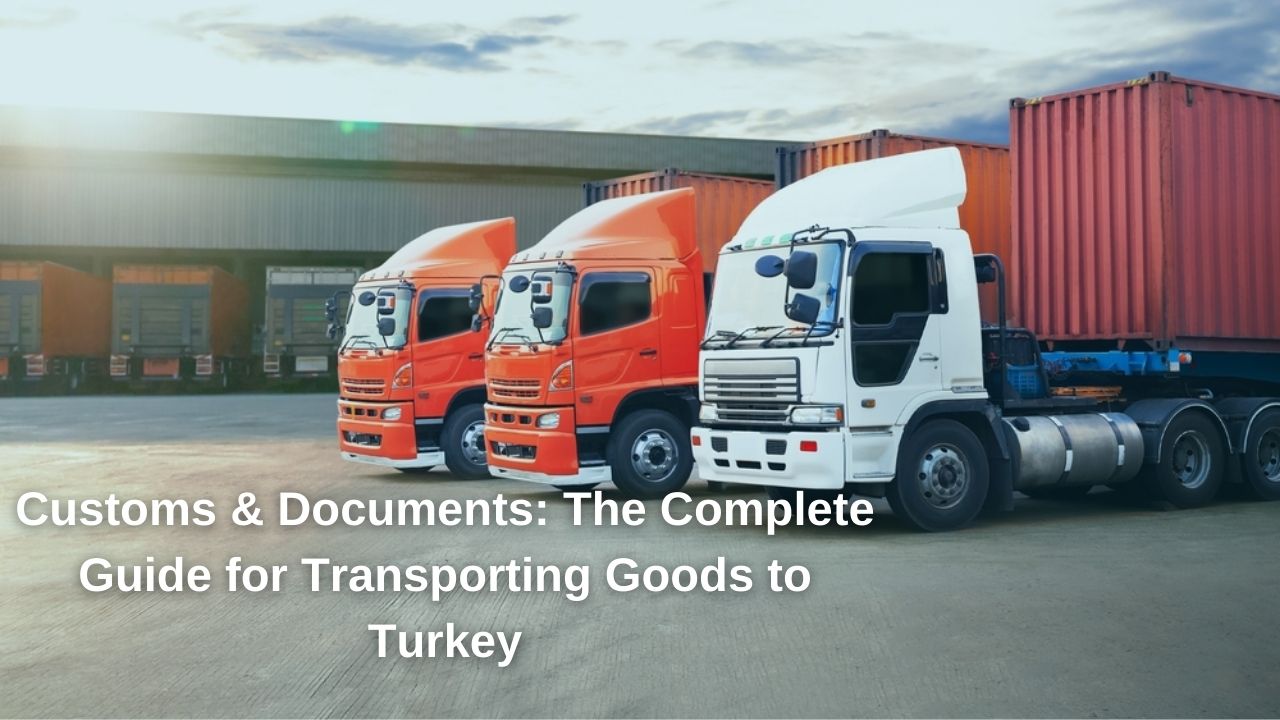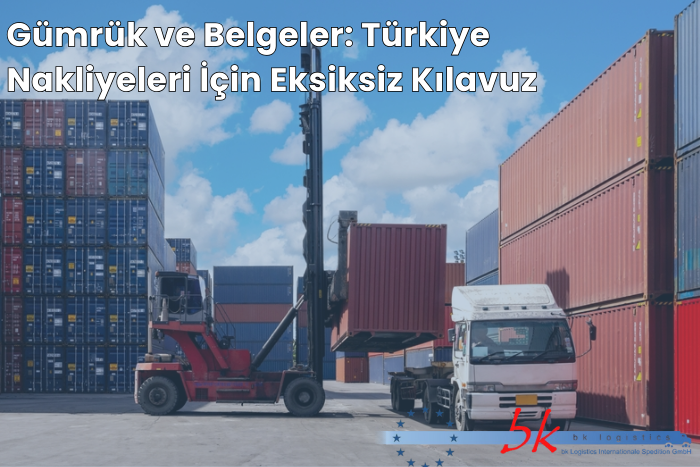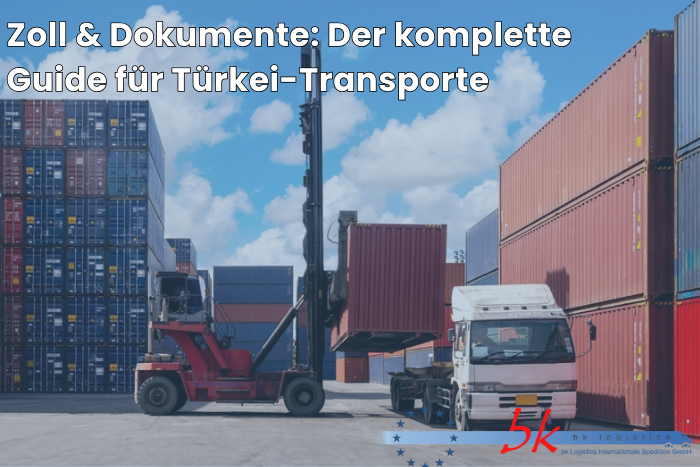News
Customs & Documents: The Complete Guide for Transporting Goods to Turkey
Table of Contents
- In Which Cases Are Customs Documents Required in Turkey Shipments?
- Which Documents Are Essential When Sending Goods to Turkey?
- How Does the Customs Process Work for German and European Companies in Turkey Shipments?
- What Happens in Turkey Shipments if Customs Documents Are Missing?
- How to Accelerate Logistics and Customs Processes in Turkey?
- Digitalized Customs Processes in Turkey: Advantages for Companies
In Which Cases Are Customs Documents Required in Turkey Shipments?
In Turkey shipments, working with the correct customs documents is critical for ensuring a smooth logistics process. When it comes to export or import operations, documents become mandatory in certain cases, and missing paperwork can lead to delays or additional costs.
Especially for international shipments from Turkey to Germany or from Germany to Turkey, documents such as a commercial invoice, packing list, and certificate of origin may be required depending on the type of goods. These documents help ensure proper classification at customs and accurate calculation of taxes and fees.
Additionally, some specific products may require certificates or permits. For example, health certificates are mandatory for food and agricultural products, while special permits are required for hazardous materials. These documents guarantee that products are transported safely both in Turkey and the destination country.
BK Logistics ensures that correct customs documents and procedures are followed in international shipping operations, preventing any disruptions during the transportation process. Proper and timely preparation of documents helps speed up shipments and keeps costs under control.
In Turkey shipments, customs documents are required depending on the type of transport, the nature of the goods, and the destination country's requirements, and should be planned in advance for a smooth logistics process.
Which Documents Are Essential When Sending Goods to Turkey?
When sending goods to Turkey, certain essential documents are mandatory for a smooth logistics process. These documents ensure both the safe transport of goods and the quick and accurate completion of customs procedures.
First, the commercial invoice is considered the primary document for every shipment. It includes the type, quantity, value of the goods, and information about the sender and receiver. Accurate and complete preparation of the invoice prevents potential customs issues. The accompanying packing list provides detailed descriptions of the shipped items and facilitates checks during transport.
For some products, a certificate of origin may be required. This is particularly important for food, agricultural, or specially manufactured products, proving the country of origin and compliance with required standards. Similarly, relevant permits or certificates should be prepared for hazardous or regulated goods.
BK Logistics ensures that all mandatory documents and procedures are fully applied for shipments to Turkey. Proper document preparation shortens transport times and prevents additional costs. It also helps ensure that shipments reach the recipient safely without any disruptions.
Therefore, when sending goods to Turkey, essential documents should be planned in advance and prepared completely.
How Does the Customs Process Work for German and European Companies in Turkey Shipments?
In Turkey shipments, the customs process is especially critical for German and European companies. This process starts when the goods enter Turkey and continues with the verification and approval of all required documents. BK Logistics guides companies at this stage to ensure that logistics processes proceed uninterrupted.
First, a commercial invoice and packing list must be prepared for the shipment. These documents include the type, quantity, value of the goods, and sender and recipient details. Complete and accurate documentation prevents delays at customs. Especially for shipments from Europe, certificates of origin and, in some cases, additional certificates may be requested.
The customs process continues with Turkish authorities reviewing the goods and comparing them with the submitted information. BK Logistics ensures that customs declarations are correctly prepared and submitted, contributing to faster processing. Missing or incorrect documents may result in goods being held and additional costs.
For German and European companies, effective management of the customs process is crucial for optimizing shipping costs and reducing delivery times. Therefore, customs procedures should be planned in advance and executed with professional support for every shipment to Turkey. BK Logistics enables companies to manage this process smoothly and efficiently.

What Happens in Turkey Shipments if Customs Documents Are Missing?
In Turkey shipments, missing customs documents can seriously disrupt the process. Incomplete or incorrect paperwork can cause goods to be held at customs and delay delivery times. BK Logistics guides companies to ensure documents are correctly and fully prepared in such cases.
In particular, if the commercial invoice, packing list, or certificate of origin is missing, goods will be held for additional inspections. This can result in both time loss and extra costs. Incorrectly declared information can cause serious delays at customs and, in some cases, product returns.
Missing documents can also lead to issues in tax and fee calculations. If applicable taxes are not accurately calculated, customs officers may request additional documents, extending the process. BK Logistics ensures that documents are complete, keeping costs under control and ensuring timely delivery.
For shipments from Europe and other countries, complete and accurate documentation is critical. Missing customs papers can lead to goods being stored and disrupt transportation plans. Therefore, in Turkey shipments, documents should be checked from the planning stage and the process managed with expert support such as BK Logistics.
How to Accelerate Logistics and Customs Processes in Turkey?
Accelerating logistics and customs processes in Turkey is particularly critical for companies engaged in import and export. Slow processes can result in goods being held in storage and delayed deliveries. BK Logistics optimizes these processes to minimize both time and cost losses for companies.
The first step is ensuring that customs documents are complete. By pre-checking commercial invoices, packing lists, and certificates of origin, requests for additional documents by customs officers are minimized, and processing times are shortened. Additionally, the use of electronic customs declaration systems accelerates the process.
In logistics planning, route and transport method optimization is important. Determining which mode of transport (road, sea, or air) is faster and more cost-effective shortens delivery times. BK Logistics provides customers with analyses and recommendations in this regard.
Another critical aspect of the process is pre-notification and coordination. Communicating with customs and transport teams before shipments begin prevents unexpected disruptions. Additionally, planning loading and unloading times helps speed up the logistics flow.
Moreover, the use of automation and digital tracking systems reduces manual operations and enables real-time logistics tracking. This allows both the company and customs authorities to manage processes more efficiently.
Digitalized Customs Processes in Turkey: Advantages for Companies
The digitalization of customs processes in Turkey offers significant advantages, especially for companies engaged in import and export. Digital systems allow documents to be transmitted electronically, reducing manual tasks and shortening processing times. BK Logistics guides companies in making the most efficient use of digital processes.
Electronic customs declaration systems allow companies to prepare documents in advance and minimize errors. Pre-entered information enables customs officers to assess processes quickly, reducing waiting times. This saves time and lowers costs.
Another advantage of digitalization is evident in cargo tracking and logistics optimization. Companies can monitor the transportation process in real time using platforms provided by BK Logistics and anticipate potential delays. This ensures more effective shipment planning and shorter delivery times.
Automation systems also play a critical role in risk and compliance management. Missing or incorrect documents can be easily detected and corrected via digital systems, preventing possible delays or penalties at customs.
Another important advantage of digital processes is the reporting and analysis capability. Companies can analyze past shipment data to improve logistics strategies and optimize costs. BK Logistics provides data-driven recommendations to support companies in this area.


